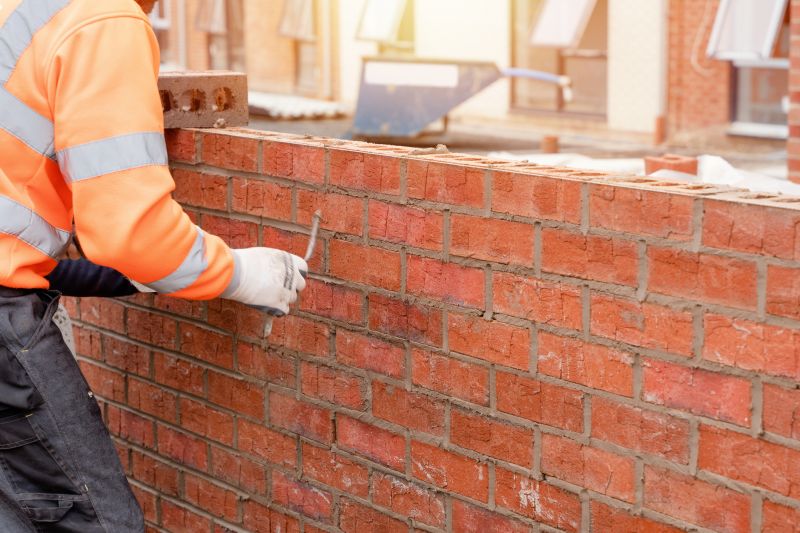Essential Products For Professional-Quality Brick Repairs
Equip yourself with premium tools and materials that meet the demands of expert brick restoration work.
 Brick repairs are a common aspect of maintaining and restoring the structural integrity and aesthetic appeal of masonry constructions. Whether addressing minor cracks, missing mortar, or larger damaged areas, selecting the right products is essential for achieving durable and visually appealing results. Proper repair materials can help prevent further deterioration, improve safety, and extend the lifespan of brick structures. It's important to understand the variety of products available, their specific uses, and how they integrate into different repair projects.
Brick repairs are a common aspect of maintaining and restoring the structural integrity and aesthetic appeal of masonry constructions. Whether addressing minor cracks, missing mortar, or larger damaged areas, selecting the right products is essential for achieving durable and visually appealing results. Proper repair materials can help prevent further deterioration, improve safety, and extend the lifespan of brick structures. It's important to understand the variety of products available, their specific uses, and how they integrate into different repair projects.
Top Overall Option
Multi-Purpose Masonry Repair Compound
This versatile repair compound is designed for filling cracks, patching damaged bricks, and sealing surfaces. It offers excellent adhesion to masonry surfaces, remains flexible to accommodate slight movements, and cures to a durable finish. Suitable for indoor and outdoor applications, it can be painted or stained to match surrounding brickwork, making it a reliable choice for various repair scenarios.
Types of Products For Brick Repairs
Mortar Mixes
Pre-mixed or dry mortar mixes formulated for repointing and patching bricks, available in various colors and formulations.
Brick Repair Patches
Pre-cut patches designed to cover larger damaged areas, often with adhesive backing for easy application.
Flexible Sealants
Elastomeric sealants that accommodate movement and prevent water infiltration in cracks and joints.
Hydraulic Cement
Quick-setting cement used to stop active leaks and repair cracks exposed to water or moisture.
Epoxy Masonry Repair Kits
Two-part epoxy systems for bonding and filling damaged bricks or mortar joints with high strength.
Waterproofing Sealers
Sealers applied to brick surfaces to repel water and prevent moisture penetration.
Color-Matched Mortar
Mortar in various shades to blend repairs seamlessly with existing brickwork.
Repointing Trowels
Specialized tools for applying and shaping mortar during repointing projects.
Brick Cleaning Solutions
Chemical cleaners designed to remove stains, efflorescence, and dirt before repair work.
Expansion Joint Filler
Materials used to fill joints that accommodate expansion and contraction of brickwork.
Grout and Joint Fillers
Products for filling and sealing mortar joints to improve stability and appearance.
Concrete Patching Compounds
Materials suitable for repairing concrete areas adjacent to brickwork.
Rust Removers
Solutions to eliminate rust stains from brick surfaces.
Anti-Carbonation Sealers
Protective coatings that extend the life of brick surfaces by reducing carbonation effects.
Repair Caulks
Flexible caulks for sealing small cracks and joints around brickwork.
Brick Restoration Mortar
Specialized mortars designed for historic or delicate brickwork to match original textures.
Bonding Agents
Primers and adhesives that improve the adhesion of repair materials to existing brick surfaces.
Popular Choices
Widely used for stopping active leaks and repairing cracks exposed to moisture.
Commonly chosen for sealing cracks and joints due to their ability to accommodate movement.
Popular for blending repairs seamlessly into existing brickwork.
Favored for their strong bonding properties and durability in structural repairs.
Essential tools for precise application of mortar during repair projects.
Chosen for protecting brick surfaces from water damage and weathering.
Popular for preparing surfaces before repairs and restoring brick appearance.
Commonly used to manage movement and prevent cracks in brick structures.
Frequently selected for completing mortar joints and enhancing stability.
Used for small cracks and gaps, valued for their flexibility and ease of use.
Popular for improving adhesion of repair materials to existing surfaces.
Versatile for a range of repointing and patching applications.
Trusted for long-term protection against moisture intrusion.
Convenient for covering larger damaged areas quickly.
Often used for urgent repairs involving leaks or cracks.
Selected for high-strength bonding and structural repairs.
Popular for cleaning stains from brick surfaces.
When undertaking brick repairs, choosing appropriate mortars, patching compounds, and sealants is crucial. These products must be compatible with existing bricks and mortar to ensure a seamless and long-lasting repair. Surface preparation, application techniques, and curing times also influence the overall success of the repair process. For larger projects, specialized tools and repair kits can streamline the work and improve consistency.
In addition to traditional mortar and patching compounds, there are innovative solutions like flexible sealants and waterproofing products that help protect against moisture intrusion and weathering. For aesthetic repairs, color-matched mortars and fillers can blend repairs seamlessly into existing brickwork. Understanding the different product types and their specific functions enables homeowners and professionals to select the most suitable options for their repair needs, ensuring both durability and visual harmony.
Key Buying Considerations
- Compatibility with existing brick and mortar materials to ensure seamless repairs.
- Type of damage or deterioration to select the most appropriate product.
- Weather resistance and suitability for outdoor or indoor use.
- Ease of application and curing time to fit project timelines.
- Flexibility of the product to accommodate slight movements or settling.
- Color options or the ability to match existing mortar for aesthetic consistency.
- Waterproofing and sealing capabilities for moisture protection.
- Durability and long-term performance expectations.
- Compatibility with paints or stains if aesthetic finishing is desired.
- Type of repair: surface patching, crack filling, joint sealing, or structural bonding.
- Tools required for application and whether they are included or need to be purchased separately.
- Environmental conditions during application, such as temperature and humidity.
- Cure time and whether the product requires special handling or curing conditions.
- Cost considerations relative to project size and repair frequency.
- Manufacturer reputation and product reviews for reliability and performance.
This page contains affiliate links. We may earn a commission from qualifying purchases, which helps support our content and recommendations.
